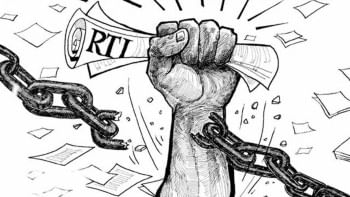Right to Information in Bangladesh: Are we on the right track?

September is the month for annual stocktaking of the Right to Information (RTI) regimes globally. The United Nations has designated September 28 as the International Day for Universal Access to Information (IDUAI). RTI enthusiasts all over the world use the occasion to bring focus on the revolutionary objectives of the law, discuss prospects and problems of implementation and identify strategies to overcome challenges encountered.
In Bangladesh, the agenda for the day is normally focused on the roles of the two key players – NGOs and the Information Commission (IC) – in implementing the law. Roadshows, rallies, fairs, seminars, etc held on the occasion are mainly aimed at awareness-building and highlighting of their various activities. Unfortunately, there is little scope in all these for discussion and debate on the formidable challenges that continue to bedevil the system or on the identification of strategies to overcome them. This, we believe, must change.
To obtain the full potentials of the law, we must go beyond such perfunctory rituals and focus more on strategies to go ahead. Only citizen groups can undertake such a task, as neither the IC nor the government has the same interest in the matter.
A first step would be to recognise that, despite evident success in keeping the law alive and kicking, the RTI community in Bangladesh has so far failed to develop a mechanism for effective cooperation and coordination among themselves to confront many of the impediments to progress. The need for them to evolve into a unified force cannot, therefore, be overemphasised. A resolve to activate the RTI forum would be a good start.
There is reason for hope, though. Collective efforts over the years by many NGOs, individual activists and the IC have helped to improve people's understanding of the goals and objectives of the law – though much still remains to be achieved.
A casual look at the categories of issues on which people invoked the law in recent times indicates a slow but steady evolution from individual interest to collective value of RTI mechanisms. There is an increasing realisation that the primary objective of the law is to promote public good through improved governance. It helps bring all public offices, using public funds, including private entities, under people's surveillance. By accessing relevant information from them, citizens can ascertain if they are performing their duties in accordance with the law. It is not an easy task and there is still a long way to go. Most citizens would benefit from guidance on how to select topics for intervention and formulate queries properly. Leaders of the RTI community should organise such guidance.

Another important goal would be to attract more people, who are knowledgeable about governance and development issues, to join forces in using the law. The full potential of RTI can be realised only when it is used to address larger issues of public concern, such as expenditures on mega projects, oversight on large government undertakings, decision-making on important national issues, etc. The reason for people's reticence in using the law and measures to change the situation deserve collective attention.
Another good initiative would be to develop a module for testing if RTI interventions are helping to achieve the desired objectives of the law. A key test would be to observe whether they are contributing to greater openness in the work of public offices; whether there is positive change in the behaviour of public officials towards people generally; and if there are signs of systemic change in the way they do their job and relate to the people. It may be too early to expect such changes, but the exercise itself will be useful to alter people's perception of governance.
Possible corrective measures also include looking at how public authorities apply the exemption clauses, included in Section 7 of the RTI Act. Anecdotal evidence indicates a growing tendency among Designated Officers (DOs) dealing with RTI requests to reject them offhand by using different exemptions, without substantive reasoning. Unless they are challenged systematically, the value of the law will diminish drastically. The IC must be urged to alert DOs about the consequences of such illegal practices.
This brings us to decisions of the IC itself. It, too, often fails to provide elaborate analysis of the issues raised and adequate justification for decisions taken, particularly those relating to intricate points of law. As a quasi-judicial entity, it is incumbent upon the IC to provide "reasoned decisions," which is key to natural justice. Moreover, IC decisions can impact heavily on people's understanding of the law and to highlight its objectivity. A collective submission by the RTI community to the IC could also be useful to lobby the government to provide the agency with the required human resources.
And finally, as all IC decisions are final and can only be challenged on legal issues at the High Court, this too must receive special attention from the RTI community. Decisions considered faulty or unfair by users, which remain unchallenged for lack of adequate funds to file petition to the Court, should benefit from collective intervention on a selective basis.
Let this year's observance of IDUAI set the tone for more meaningful and constructive engagement by the RTI community on such occasions in the future.
Shamsul Bari and Ruhi Naz are chairman and assistant director (RTI), respectively, at Research Initiatives, Bangladesh, RIB. Email: [email protected]

 For all latest news, follow The Daily Star's Google News channel.
For all latest news, follow The Daily Star's Google News channel. 







Comments